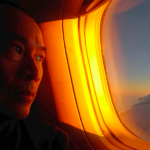Over the course of his career, Rolf Potts has taken his keen postmodern travel sensibility into the far reaches of five continents for such publications as National Geographic Traveler, Salon.com, and The New York Times Magazine. This book documents his boldest, funniest, and most revealing journeys — from getting stranded without water in the Libyan Desert, to crashing the set of a Leonardo DiCaprio movie in Thailand, to learning the secrets of Tantric sex in a dubious Indian ashram.
Marco Polo Didn't Go There is more than just an entertaining journey into fascinating corners of the world. The book is a unique window into travel writing, with each chapter containing a commentary track — endnotes that reveal the ragged edges behind the experience and creation of each tale. Offbeat and insightful, this book is an engrossing read for students of travel writing as well as armchair wanderers.
Potts is one of the best travel writers to emerge in the last decade. Intrepid and thoughtful, he's a Paul Theroux for the backpacker generation, and Marco Polo reflects this." —San Francisco Chronicle
This hilarious collection of stories provokes because Potts asks the serious question of how to travel in a discovered world. ...With its wonderful stories and honest insights, Marco Polo Didn't Go There is the best — and most quirky — post-modern travel-writing text book available on either side of the Atlantic. ...If you aspire to be a travel writer, read this book." — The Guardian (U.K.)
Potts, Internet raconteur and travel-advice sage, is the kind of guy you wish the pubs had more of: well traveled, generous with funny stories, eager to listen to yours. You feel envious that you weren't with him in Cairo to share the convivial squalor of a backpacker hotel, or at an Indian ashram to study Tantric sex, or even in the Libyan Desert, in the dark, out of water and lost. And he's able to draw insights from all that without draining the fun out of the conversation — difficult to carry off in a pub or a book." —Washington Post
Rolf Potts' name may not be as familiar as Paul Theroux or Jan Morris, but he's as skilled a travel writer as anyone out there." —New Orleans Times-Picayune
Rolf Potts, a 'postmodern' travel writer, reflects on his craft and says exoticism has seen its day." —NY Times "Ideas" blog
I did not really know where I was going, so, when anyone asked me, I said to Russia. Thus, my trip started, like an autobiography, upon a rather nicely qualified basis of falsehood and self-glorification." — Evelyn Waugh, "Labels"

Introduction
The title of this book is not my own creation: It is a direct quote from an inmate I met at Bangkok's women's prison in January of 1999. At the time I had been a full-time travel writer for less than a month, and I'd been telling people I planned to travel across Asia in the footsteps of Marco Polo.
Looking back, I'm not sure why I found it necessary to say this. I guess I was just following the presumed formula of what travel writers were supposed to do.
Indeed, at the very moment I was setting out from Asia, various travel scribes were researching or publishing books that diligently traced the international footsteps of Captain Cook, Che Guevara, Moses, Sir Richard Burton, William of Rubruck, John Steinbeck, Lewis and Clark, Robinson Crusoe, Ibn Battuta, Robert Louis Stevenson, and Herman Melville. Journeying in the footsteps of others had, it seemed, become the travel-literature equivalent of cover music — as common (and marketable) as Whitney Houston crooning Dolly Parton tunes.
As it turned out, my own "footsteps" ruse lasted less than one month before I found my way into the visiting room of a women's penitentiary just outside of Bangkok. As unusual as it might sound, visiting Western prisoners was all the rage among backpackers when I'd arrived in Thailand. In cafes and guesthouse bulletin boards along Khao San Road, photocopied notices urged travelers to take a day off and call on prisoners at the various penitentiaries around Bangkok. Figuring this might be an interesting deviation from the standard tourist-circuit activities, I went to the American embassy and received a letter of introduction to an unlucky drug trafficker named Carla.
Brief acts of presumed kindness carry a whiff of narcissism: As I took a series of buses through the snarl of Bangkok traffic to the edge of the city, I imagined Carla to be a weary, desperate woman who would thank me for the small gift of magazines and the encouragement to keep persevering behind bars. In reality, Carla was a tough, pretty Puerto Rican woman who arrived in the visitor's room fifteen minutes late smelling like shampoo, and regarded me with ambivalent cordiality. After speaking for a while about her own situation (her fateful decision to make a quick buck delivering Thai heroin to New Jersey for an acquaintance; her plans upon her release in nine more months), she began to steer the conversation toward me.
"Why did you come to Thailand?" she asked.
"My primary goal is to follow the route of Marco Polo through the Orient."
"Oh yeah?" Carla said. "Where are you going after Bangkok?"
"North," I said. "Probably to Chiang Mai for a while."
"Chiang Mai?" Carla raised a skeptical eyebrow at me. "Marco Polo didn't go there."
Though I didn't know it at the time, this simple observation was to change the way I traveled, far beyond Asia.
In retrospect, there are a number of reasons why my Marco Polo quest never would have worked. For starters, Carla was right: There is no evidence the famous Venetian explorer ever made it to Thailand, let alone Chiang Mai. Moreover, I later discovered that William Dalrymple had written a book in the narrative footsteps of Marco Polo a good decade earlier. Dalrymple's In Xanadu was not to be confused with Clarence Dalrymple Bruce's classic In the Footsteps of Marco Polo — and neither of these books were to be confused with Jin Bohong's In the Footsteps of Marco Polo (which was published the same year as In Xanadu).
Logistics and marketing aside, however, I came to realize that "Marco Polo didn't go there" was not just a statement of geography: Intentional or not, it was a keen observation about the postmodern reality of far-flung lands. Unlike Marco, my travels were not a simple journey from Home to The Other and back. At any given moment in Southeast Asia, I was likely to run into a Burmese Shan refugee who could quote West Coast hip-hop to illustrate his plight, a Laotian Hmong tribesman who'd recently visited his relatives in Minneapolis, or a Jewish-American Buddhist who'd slept in suburban Maryland thirty-six hours earlier. Whereas Marco had traveled into a mysterious and frightening terra incognita, I was traveling into a globalized Asia that had long since been visited by the oracle of mass media and the shock troops of mass tourism.
I use the word "tourism" intentionally, since it defines how people travel in the twenty-first century. Sure, we all try to convince ourselves that we're "travelers" instead of "tourists," but this distinction is merely a self-conscious parlor game within the tourism milieu. Regardless of how far we try to wander off the tourist trail (and no matter how long we try and stay off it) we are still outsiders and dilettantes, itinerant consumers in distant lands. This is often judged to be a bad thing, but in truth that's just the way things are. Platonic ideals aside, the world remains a fascinating place for anyone with the awareness to appreciate its nuances. Social critics who proclaim that "real travel" is dead are just too lazy to look for complexities within an interconnected planet — and travel writers who seek to diminish their own presence in the tourist matrix are simply not being honest. "Footsteps" might be a nice thematic vessel in which to pour a travel book, but it tends to miss out on the vibrant, often contradictory (and decidedly non-thematic) experience of what it's like to travel in a postmodern world.
This in mind, I scrapped my Marco Polo quest within a week of visiting Bangkok's women's prison. Suddenly liberated from a sober travel-writing mission, I realized that my truest travel urge at that very moment was to crash the set of a Leonardo DiCaprio movie that was being filmed near Phuket. Giving Chiang Mai a miss, I headed south.
The gonzo travel story I penned for Salon two weeks later, "Storming The Beach," went on to appear in The Best American Travel Writing 2000. It also appears as the first chapter of this book, since it set the tone for the stories I would write in the years that followed (including "Backpackers' Ball at the Sultan Hotel," appearing here as chapter 10, which in spite of everything takes place in the Egyptian footsteps of Gustave Flaubert).
Having explained the title of this book, I should clarify the subtitle: "Stories and Revelations from One Decade as a Postmodern Travel Writer."
In a sense, "postmodern" is a confusing appellation, since the word is used in slightly different ways when describing, say, literary theory, or interior design, or TV commercials. I use the word to describe the increasing placelessness that accompanies any information-age journey. Many recurring themes of the travel tales in this book (the weird gap between expectations and reality; the challenge of identifying "authenticity" in post-traditional settings; the realization that unexpected encounters help you better see places for what they are) are the result of this dislocation.
I also find "postmodern" fitting to describe my own writing career, since my earliest travel tales debuted online (in venues like Salon and World Hum) while I was in the midst of a two-year vagabonding journey across Asia and Europe. Whereas previous generations of travel writers enjoyed comfortable stretches of editorial time and geographical space to achieve a romanticized distance from their stories, I never had that luxury. Mention in an Internet travel story that your Cambodian guesthouse owner served you twako pork sausages, and you're bound to get an instant and bewildering array of e-mails — from the British academic who notes that "twako" is an incorrect transliteration; to the Arizona vegan who insists that pork is murder; to the Cambodian guesthouse owner himself, who now fears all his guests will demand complimentary sausages. In this environment it's difficult to offer up travel stories as authoritative, self-contained universes. Exotic postcard-panoramas that might once have passed for travel reportage soon become secondary to a more subjective and interactive attempt to draw connections, intuit meanings, and interpret the landscape.
Thankfully, the Internet allows for narrative leeway that isn't always possible in traditional news media or print-based travel publications. Just as international news reporters tend to move in packs from one global crisis to another, travel magazines often build their content around photographs and consumer demographics. And, while hard news and vacation tips have their place, the Internet has afforded travel writers a unique privilege: the simple opportunity to write about their experiences as they see fit, in their own voice, without the constraints of service information or the contrivance of a news hook.
Thus, while my travel-writing career soon advanced into the better-paying world of print journalism, I owe much to my online roots. To this day, I continue to write several stories each year for Internet magazines, as the narrative flexibility more than makes up for the smaller paycheck. Of the twenty stories in this collection, a little more than half originally appeared in online form.
In collecting these stories, I have also added endnotes that reveal the ragged edges behind each tale: how I chose to arrange the facts; what was taken out, and why; what happened just before or after the events described in the story. I realize that this sort of meta-commentary might be seen as a po-mo indulgence, but I find it curiously appropriate for a travel book, especially one that covers a lot of geography. In addition to adding a twist of humor and self-deprecation, these endnotes aim to remind the reader of the gap between story and experience, traveler and writer, truth and presentation. The endnotes reveal things about the journey that — for the sake of good storytelling — one can't reveal in the main text. Just as a photographer might seek to crop out the modern tourists who cluster around an ancient monument, the travel writer ignores those parts of reality that don't serve the threads and themes of his narrative. My endnotes are a reminder that those undesirable-yet-real elements — those fat tourists who screw up the symmetry of the Taj Mahal (so to speak) — still exist.
Hence, my endnotes might be thought of as the book's DVD-style "commentary track" or outtakes — alluding to other things that happened (or, on occasion, things that didn't happen), questioning my portrayal of places and people I invariably knew only for a couple of hours, and reminding the reader that the laws of nature and the laws of storytelling are separate entities.
Some of my endnotes serve different purposes than others. The endnotes to chapters 12 and 13, for example, deal with the wacky ethical and logistical challenges of stories that were funded by "press trips" to Greece and Grenada. The chapter 15 endnotes explain why I left some of the funniest details out of my Beirut tale; the chapter 6 endnotes share some ironic details of what happened to me after I was robbed in Istanbul; the chapter 10 endnotes are primarily a rant in defense of backpacker culture. Other endnotes reveal why I withheld certain details about my expat sojourn in Thailand, how I met one of the characters from Bruce Chatwin's The Songlines in Australia, and why I didn't care much for Vietnam. Chapter 20 contains no endnotes at all — but only because the story itself is a self-referential series of endnotes about the travel writing process.
Most all the endnotes contain insights about the writing of the story itself. In this way, Marco Polo Didn't Go There might well serve as a quirky travel-writing textbook, since each story is offset by an annotated peek into its own creation.
That said, I must share a few warnings about the endnotes. First and foremost, they are designed to be read after the story itself. Just as you don't view the special features on your Big Lebowski DVD before you've watched the movie itself, you should avoid dipping into a chapter's endnotes until you've finished its main text. Digest the story first, then read the commentary.
I might add that there's no need to read the endnotes at all if you prefer your travel tales to be self-contained and seamless. One reading strategy might be to read all the stories first, then go back and dip into the endnotes of the chapters that most interested you. These annotations don't form a comprehensive body of work — they only exist to comment on the chapters in question — so they can be read (or ignored) at your discretion.
Keeping this in mind, let us now proceed to some curious corners of planet earth — places I might never have experienced had I been faithfully following the footsteps of a certain Venetian merchant.
Excerpted from Marco Polo Didn't Go There by Rolf Potts ©2008. Excerpted by permission of Travelers' Tales. All rights reserved. No part of this excerpt may be reproduced or reprinted without permission in writing from the publisher.
Order the Book
International orders:
United Kingdom | Germany | France | Spain | Netherlands





